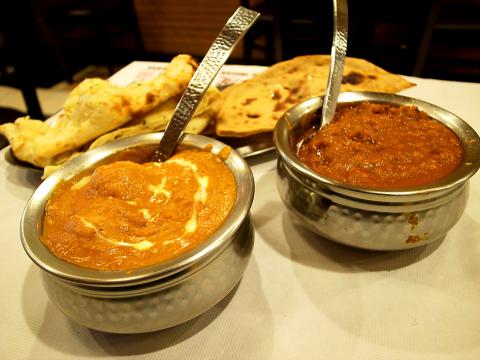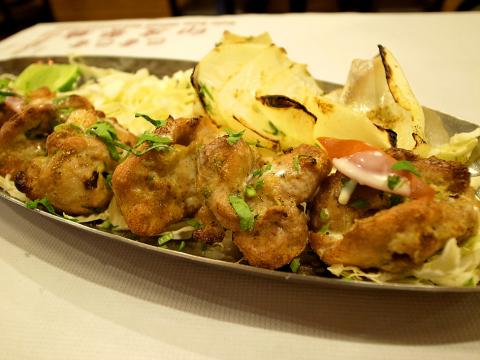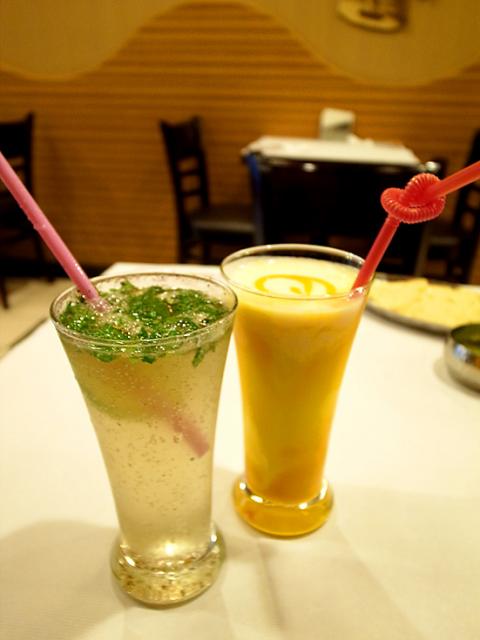Finding a really good Indian restaurant can be a difficult task in Taipei, where choices are limited not so much because of the small number of dining spots, but because of the similar, if not exactly identical, food on offer. Fortunately, progress is occasionally made with the arrival of establishments such as the Balle Balle Indian Restaurant & Bar.
Opened more than one year ago on Guangfu North Road (光復北路) near Bade Road (八德路), the place first caught my attention when I walked past the storefront and saw it was packed with patrons many of whom were Indian. And the reason for its brisk business proves to be self-evident as soon as I took my first bite of the rich flavors from the Indian subcontinent finely rendered at Balle Balle.
Balle Balle’s kitchen is fully devoted to Punjabi cuisine from the Punjab region in north India. As it turns out, many of the popular elements of the Indian cuisine such as tandoori cooking is derived from the region. Compared to the often extensive menus that have the weight of a book at similar establishments, the Punjabi-centered eatery has a diner-friendly carte mainly composed of appetizers, tandoori food, curry dishes and breads. Meanwhile, ingredients used by the restaurant’s team of Indian chefs directly come from the Indian specialty store which is the owner’s other business venture.

Photo: Ho Yi, Taipei Times
As Punjab is also the birthplace of Sikhism, the space is bedecked with ornaments and objects that represent its religious and cultural roots, including a life-size statue of a Sikh greeting diners by the entrance. Apart from the Sikh figurines and dolls, the dining environment is neatly arranged, devoid of gaudy travel photos of South Asian landmarks and exudes a feel of straightforwardness that is strangely comforting.
Equally reassuring is the Indian manager known as GV. Speaking fluently in English and Mandarin, the manager is as friendly as he is helpful in making recommendations and answering patrons’ needs.
With the help of GV, my dining partner and I started our meal with murg malai kebab (NT$380), a tandoori starter made up of boneless chicken marinated with cashew paste, homemade cream and spices. We were both won over by the surprisingly tender, succulent meat, accompanied by the slightly charred, lusciously sweet onions.

Photo: Ho Yi, Taipei Times
The vegetarian alternative to the chicken tandoori snack is paneer tikka, which involves Indian cottage cheese grilled in a clay oven. Among them, hariyali paneer tikka (NT$410) is marinated with yogurt, cashew paste and flavored with mint and spinach.
From the curry section, which comprises choices of chicken, lamb, fish and vegetables, we chose veg kofta (NT$290), featuring soft balls made from mashed potatoes and mixed vegetables and submerged in onion and cashew gravy, while spices including ginger and coriander add punch to the delightfully creamy dish.
The gosht rahra (NT$360) delivered a wow effect with the offering of tender, boneless mutton tossed in onion gravy and makes another mild, smooth curry delicacy.

Photo: Ho Yi, Taipei Times
The restaurant has a wide variety of naan, roti, kulcha and paratha. Both the garlic naan (NT$75) and tandoori roti (NT$85) we tried were satisfyingly substantial and chewy. Amritsari aloo kulcha (NT$120) particularly impressed with the savory stuffing of mashed potatoes and spices.
For drinks, the restaurant offers the richest and thickest mango lassi (NT$120) I have ever tried. But the best companion to Balle Balle’s hearty fare, in my view, is the pudhina nimbu soda (NT$80), that aids digestion with a concoction of mint leaves, lime, black pepper and salt.
With fine food and warm, attentive service, Balle Balle Indian Restaurant & Bar is quickly becoming my favorite spot to quench my thirst for the flavorful South Asian fare.

On April 26, The Lancet published a letter from two doctors at Taichung-based China Medical University Hospital (CMUH) warning that “Taiwan’s Health Care System is on the Brink of Collapse.” The authors said that “Years of policy inaction and mismanagement of resources have led to the National Health Insurance system operating under unsustainable conditions.” The pushback was immediate. Errors in the paper were quickly identified and publicized, to discredit the authors (the hospital apologized). CNA reported that CMUH said the letter described Taiwan in 2021 as having 62 nurses per 10,000 people, when the correct number was 78 nurses per 10,000

As we live longer, our risk of cognitive impairment is increasing. How can we delay the onset of symptoms? Do we have to give up every indulgence or can small changes make a difference? We asked neurologists for tips on how to keep our brains healthy for life. TAKE CARE OF YOUR HEALTH “All of the sensible things that apply to bodily health apply to brain health,” says Suzanne O’Sullivan, a consultant in neurology at the National Hospital for Neurology and Neurosurgery in London, and the author of The Age of Diagnosis. “When you’re 20, you can get away with absolute

May 5 to May 11 What started out as friction between Taiwanese students at Taichung First High School and a Japanese head cook escalated dramatically over the first two weeks of May 1927. It began on April 30 when the cook’s wife knew that lotus starch used in that night’s dinner had rat feces in it, but failed to inform staff until the meal was already prepared. The students believed that her silence was intentional, and filed a complaint. The school’s Japanese administrators sided with the cook’s family, dismissing the students as troublemakers and clamping down on their freedoms — with

As Donald Trump’s executive order in March led to the shuttering of Voice of America (VOA) — the global broadcaster whose roots date back to the fight against Nazi propaganda — he quickly attracted support from figures not used to aligning themselves with any US administration. Trump had ordered the US Agency for Global Media, the federal agency that funds VOA and other groups promoting independent journalism overseas, to be “eliminated to the maximum extent consistent with applicable law.” The decision suddenly halted programming in 49 languages to more than 425 million people. In Moscow, Margarita Simonyan, the hardline editor-in-chief of the